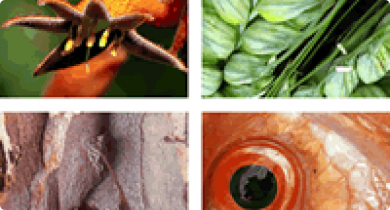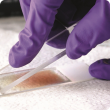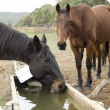Biosecurity
Biosecurity is fundamental for safeguarding our valuable agricultural resources against the threat and impacts of pests, weeds and diseases (pests).
Biosecurity is the management of the risk of animal and plant pests and diseases entering, emerging, establishing or spreading in Western Australia, to protect our economy, environment and the community.
To protect Western Australian agricultural industries from pests the Department of Agriculture and Food, Western Australia:
- Works with stakeholders to identify and manage biosecurity risks.
- Develops legislation.
- Establishes import controls.
- Conducts inspections.
- Provides quarantine services as required.
To find out more about what we do to protect agricultural production and export opportunities within the State please search our website.
Filter by search
Filter by topic
- (-) Remove Livestock biosecurity filter Livestock biosecurity
- Pests, weeds & diseases (120) Apply Pests, weeds & diseases filter
- Livestock & animals (120) Apply Livestock & animals filter
- Diseases (113) Apply Diseases filter
- Livestock health & diseases (109) Apply Livestock health & diseases filter
- Livestock disease surveillance (101) Apply Livestock disease surveillance filter
- Livestock species (83) Apply Livestock species filter
- Livestock management (50) Apply Livestock management filter
- Sheep (35) Apply Sheep filter
- Emergency animal disease preparedness (31) Apply Emergency animal disease preparedness filter
- Beef cattle (26) Apply Beef cattle filter
- Dairy cattle (21) Apply Dairy cattle filter
- Livestock movement & identification (20) Apply Livestock movement & identification filter
- Management & reproduction (17) Apply Management & reproduction filter
- Poultry & birds (15) Apply Poultry & birds filter
- Pigs (14) Apply Pigs filter
- Control methods (13) Apply Control methods filter
- Chemicals (12) Apply Chemicals filter
- Goats (11) Apply Goats filter
- Horses (10) Apply Horses filter
- Feeding & nutrition (10) Apply Feeding & nutrition filter
- Veterinary chemicals (7) Apply Veterinary chemicals filter
- Stockfeed (7) Apply Stockfeed filter
- Quarantine (7) Apply Quarantine filter
- Emergency response (7) Apply Emergency response filter
- Residues in livestock (6) Apply Residues in livestock filter
- Preventing residues (6) Apply Preventing residues filter
- Pests (5) Apply Pests filter
- Wildlife biosecurity (5) Apply Wildlife biosecurity filter
- Importing to Western Australia (5) Apply Importing to Western Australia filter
- Importing animals (5) Apply Importing animals filter
- Plant biosecurity (4) Apply Plant biosecurity filter
- Food, export & investment (4) Apply Food, export & investment filter
- Climate, land & water (4) Apply Climate, land & water filter
- Pest animals (3) Apply Pest animals filter
- Invasive species (3) Apply Invasive species filter
- Biosecurity governance (3) Apply Biosecurity governance filter
- Weeds (2) Apply Weeds filter
- Land use (2) Apply Land use filter
- Pest mammals (2) Apply Pest mammals filter
- Industry Funding Schemes (2) Apply Industry Funding Schemes filter
- Bees (2) Apply Bees filter
- Camelids (2) Apply Camelids filter
- Climate & weather (1) Apply Climate & weather filter
- Biosecurity and Agriculture Management Act (1) Apply Biosecurity and Agriculture Management Act filter
- Agribusiness Food & Trade (1) Apply Agribusiness Food & Trade filter
- Agricultural emergency response (1) Apply Agricultural emergency response filter
- Animal welfare (1) Apply Animal welfare filter




